The Genron NPO collaborated in conducting an emergency public opinion survey in Japan and the United States to learn more about people's perspectives on the upcoming U.S.-North Korea Summit to be held in Singapore on June 12, their expectations regarding the possibility of resolving the North Korea issue, and about the future of the Korean Peninsula.
The Genron NPO conducted the Japanese portion of the survey between May and June 3 this year targeting men and women across the country over the age of 18. Questionnaires were delivered to participants and self-administered, resulting in a collection of 1,000 valid samples.
In the U.S., the University of Maryland conducted an internet poll between June 1 and June 5 this year against a data panel. The data was obtained in the format of U.S. Census data, and was weighted by age, gender, income, education, race, location, and political party affiliation. A total of 1,215 valid samples were collected.
Furthermore, a joint survey was conducted by The Genron NPO and the University of Maryland in December of 2017, and comparisons for a number of questions also asked in last year's survey are included.
First, we asked respondents what sort of effect this historical summit between the U.S. and North Korea would have.
In terms of expectations regarding the U.S-North Korea Summit, citizens from both countries believe that progress is being made but that it will not lead to a concrete outcome of denuclearization. However, U.S. citizens have a more positive outlook than Japanese citizens.
In Japan, only 6.2% of respondents agreed with the optimistic statement that the summit would result in "significant progress towards denuclearization of the Korean Peninsula," whereas many believe that there will be no concrete outcome, with more than half of respondents at 52.2% believing that there will be "progress on some issues but not on denuclearization."
In contrast, "progress on some issues but not on denuclearization" was also the most frequent response among U.S. citizens at 35.9%, so more Americans have high expectations of the U.S.-North Korea Summit. A total of 21.8% of U.S. respondents believe that there will be "significant progress towards denuclearization of the Korean Peninsula," more than three times the number of Japanese respondents who selected that answer.
Those who believe the summit will end in failure were in the minority, with the responses "the summit will fail, but damage will be limited" and "the summit will fail, which will significantly increase the risk of conflict" totaling around 20% of responses for each country.
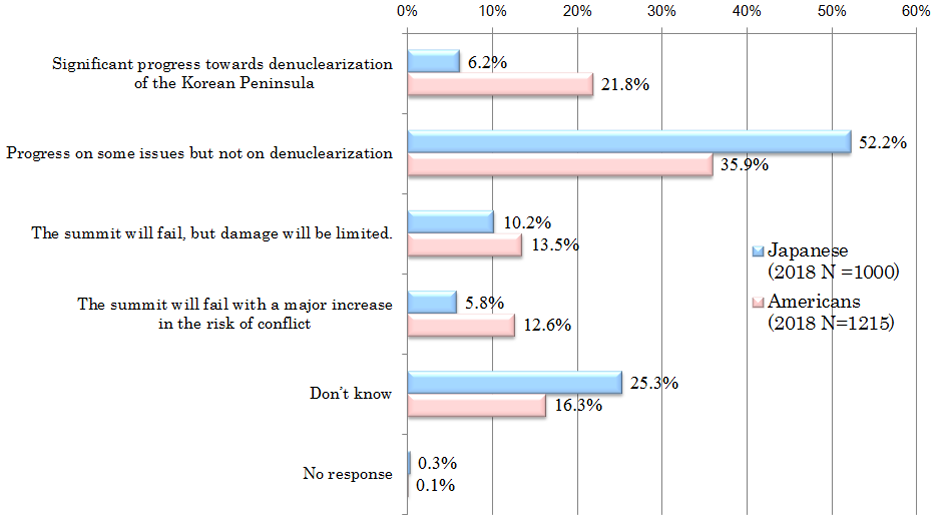
While it is recognized that progress in being made towards resolving the nuclear issue, approximately 60% of respondents in each country still hold a skeptical view.
The next question aimed to determine what impact the previous Inter-Korean Summit and the upcoming U.S.-North Korea Summit were expected to have on finding a path towards resolving the North Korean nuclear issue.
People in both countries agree that progress is being made towards a resolution to the nuclear issue, but many are still skeptical that a definitive solution will be found.
The most frequent answer in Japan at 36.8% was that the summit will "make a resolution to the nuclear issue more likely but only at some point in the future." Moreover, 28.1% responded that "they make progress on unrelated issues more likely, but the nuclear issue will remain unresolved." A similar trend can be found in the U.S. responses. The former response that the summit will "make progress on unrelated issues more likely, but the nuclear issue will remain unresolved" was most frequent at 30.4%, and "they make progress on unrelated issues more likely, but the nuclear issue will remain unresolved" was next at 25.7%.
However, while in Japan the number of respondents who answered that the summit will "make a resolution to the nuclear issue more likely soon" was no more than 2.8%, that proportion of U.S. respondents who answered in the same way was four times higher at 13.2%, showing that U.S. expectations for the summit are relatively high.
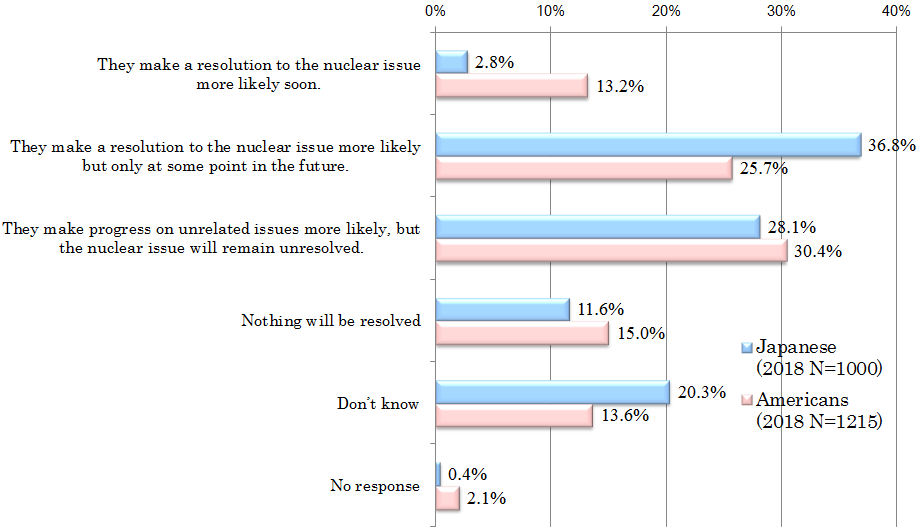
Many Americans believe that the U.S.-North Korea Summit was made possible through North Korea making the larger concession.
The next question was about which country made more concessions in order to ensure that the U.S.-North Korea Summit would be held. As usual, the most frequent response among Japanese citizens was "Don't know" at 34.9%. The remaining three responses had North Korea at 21.7%, the U.S. at 21.1% and "both at the same level" at 22.0%.
In contrast, the most frequent response among Americans at 34.3% was that North Korea had made the greater concession. This belief that North Korea made the greater concession may have naturally arisen from events at the time of the survey. When the U.S. portion of the survey was being conducted, the summit was briefly cancelled by U.S. President Donald Trump before plans were again resumed after the North Korean side approached the U.S. However, following the previous response, 22.8% believe the U.S. made the larger concession, and 23.6% answered "both at the same level." A total of 18.9% responded "Don't know."
More than 30% of Americans believe that President Trump agreed to negotiations because "a new opportunity emerged by the stated willingness of North Korean leader Kim Jong-Un to meet and discuss denuclearization." Less than 20% of respondents in either country believe that it was the result of "North Korea's success in having the ability to hurt the U.S. and its allies."
In Japan, 33.7% of people surveyed that President Trump agreed to enter into negotiations in order to improve his image in the run-up to the November mid-term elections because he "sees Korea as his most promising option as he seeks a major international accomplishment, especially after the apparently reduced chances of achieving a breakthrough in a major accomplishment in the Middle East."
In contrast, the most frequent answer among Americans at 34.3% was that he agreed because "a new opportunity emerged by the stated willingness of Kim Jong-Un to meet and discuss denuclearization as transmitted through the South Koreans." The next most frequent response was "Trump sees Korea as his most promising option as he seeks a major international accomplishment, especially after the apparent reduced chances of achieving a breakthrough in a major accomplishment in the Middle East," which was selected by 29.7% of those surveyed.
Those who believe that "North Korea's success in having the ability to hurt the U.S. and its allies got his attention" was the reason behind Trump agreeing to the negotiations stood at only 17.7% in Japan and 10.1% in the U.S.
In comparison, we also asked people's opinions on why North Korea agreed to enter into negotiations that included talks on the denuclearization of the Korea Peninsula. At 39.1%, the most frequent response to this question among Japanese respondents was that North Korea's willingness was due to "the impact of U.N. sanctions and/or Chinese pressure." Moreover, 26% of respondents answered that "the tough line, including pressure and threats, taken by the Trump administration," influenced North Korea's decision, bringing the total number of people who believe that pressure from the U.S. and the international community were responsible to more than 60%.
However, 30.8% of respondents believe that North Korean self-confidence is behind their willingness, having answered that "North Korea feels it has strong negotiating leverage after its success in developing and testing an intercontinental ballistic missile (ICBM) that can reach American soil and directly threaten the U.S. and its allies."
In contrast, 37.5% of Americans surveyed believe that it was the powerful influence of their own country that was responsible, with the most frequent answer being, "The tough line, including pressure and threats, taken by the Trump administration." This response was followed at 31.4% by "The impact of UN sanctions and/or Chinese pressure."
Those who responded that "North Korea feels it has strong negotiating leverage after its success in developing and testing an intercontinental ballistic missile (ICBM) that can reach American soil and directly threaten the U.S. and its allies" totaled 28.5%.
Almost 30% of American respondents state that their opinion of President Trump has improved with the possibility of the U.S.-North Korea Summit being held.
Japanese opinion of President Trump has changed little since the agreement was reached to hold a summit between North Korea and the U.S, whereas it has changed greatly in the U.S.
In Japan, the majority at 68.9% have "no change" in their opinion of the U.S. president, while only 13.3% answered that their opinion had "become more positive." While the "no change" response was also the most frequent in the U.S., the proportion of respondents who answered that their opinion has "become more positive" was almost three times higher than Japan at 34%. To a certain extent, Americans credit President Trump and the role he has played in obtaining an agreement from North Korea to hold the U.S.-North Korea Summit.
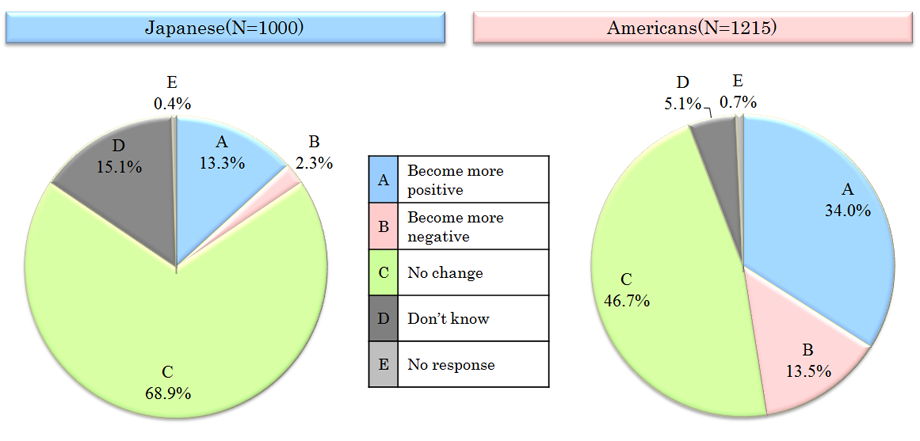
Many respondents in both countries are concerned about the possibility of U.S. military action. However, opinion in the U.S. shows that almost 30% believe that "There is a lower risk of military action" now.
In the next question, we looked into how opinion on the likelihood of the U.S. taking military action against North Korea has changed.
The surveys in both countries showed that the greater number of participants in both countries believe that "There is the same risk of military action" (Japan at 47.5% and U.S. at 38.2%), showing that citizens in the two countries are still concerned about the outbreak of military action.
However, U.S. opinion is still split with 26.8% believing that "There is a lower risk of military action" and 23.9% believing "There is a higher risk of military action." While 16% of Japanese citizens surveyed think that the risk has decreased, only 8% believe it has increased.
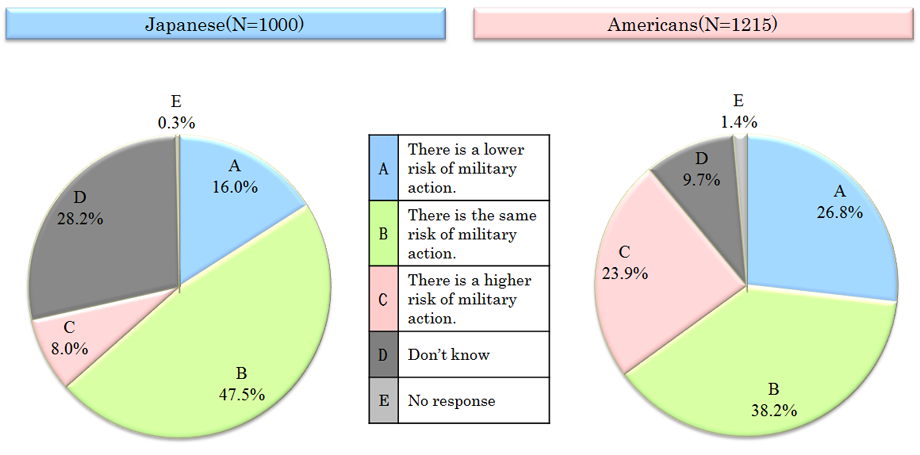
Japanese respondents believe that there will be no resolution to the North Korean nuclear issue found, showing little change since last year's survey, but U.S. expectations for a resolution are rising.
We asked respondents about their expectations for a resolution to the issue of North Korean nuclear weapon development. The majority of Japanese respondents, or 65.1%, answered that "It won't be resolved," a number that has changed little since the survey of December 2017. The next most frequent response was "Don't know" at 24.4%.
In contrast, the most frequent response among Americans was "It won't be resolved" at 25.8%, but this response shows a drastic drop since the survey last year. In comparison, 25.4% responded "It will be resolved within 5 years," which is almost 10% higher than last year's survey. In addition, the proportion of respondents who answered "Don't know" was almost half last year's survey at 23.2%.
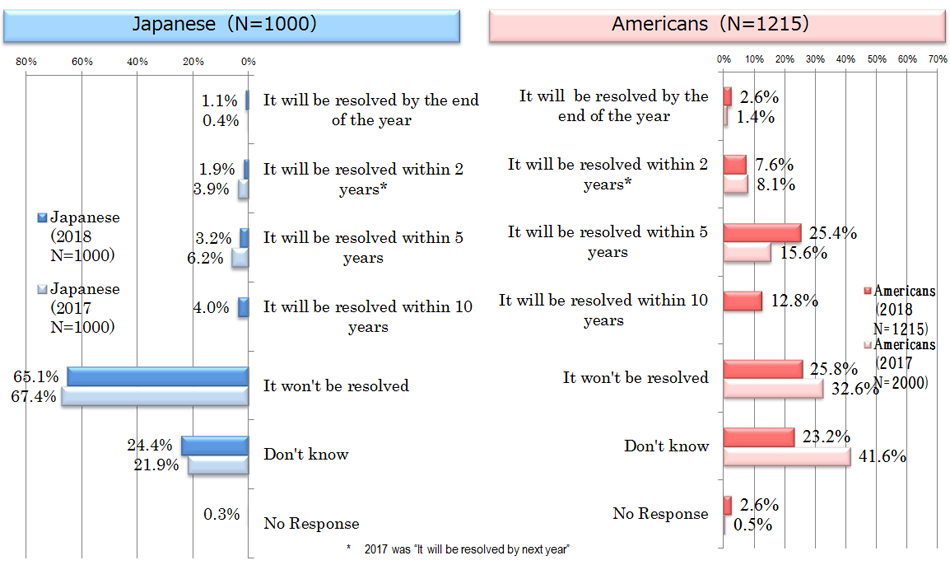
Over 60% of U.S. respondents answer that credit for this diplomatic opening lies with President Trump, but the most frequent answer among Japanese was "Don't know." More than 20% of Americans also answered Chinese leader Xi Jinping.
With a series of summits between China and North Korea, North and South Korea, and the upcoming one between the U.S. and North Korea, survey respondents were asked which leaders should get the most credit for opening a dialogue towards denuclearization of the Korea Peninsula. A majority of U.S. respondents answered "Donald Trump" at 62.9%, followed by "Moon Jae-in." Kim Jong-Un was also selected by 27.4% of Americans.
In contrast, 32.3% of Japanese answered, "Don't know," which was the most frequent response, while 22.9% answered "No one", meaning that more than 50% of Japanese give credit to no leader in particular. However, 25% of Japanese see Donald Trump as deserving, while Moon Jae-in stands at 17.5% and Kim Jong-Un at only 15.4%.
Another interesting point to note is that 22.4% of U.S. respondents credit Xi Jinping, while only 9.4% of Japanese do the same.
At the current time, neither Americans nor Japanese trust in Kim Jong-Un's intentions towards peace in the region.
The next question asked people how much they trust Kim Jong-Un's intentions in regards to building peace on the Korean peninsula. In Japan, 66.2% responded that they distrust him somewhat or completely, while only 4.1% responded that they trust him either somewhat or a great deal. In the U.S., more than 70% of respondents distrust Kim Jong-Un somewhat or completely, with the exact number at 72.1%, higher than Japan. Only 6.6% trust him to some extent.
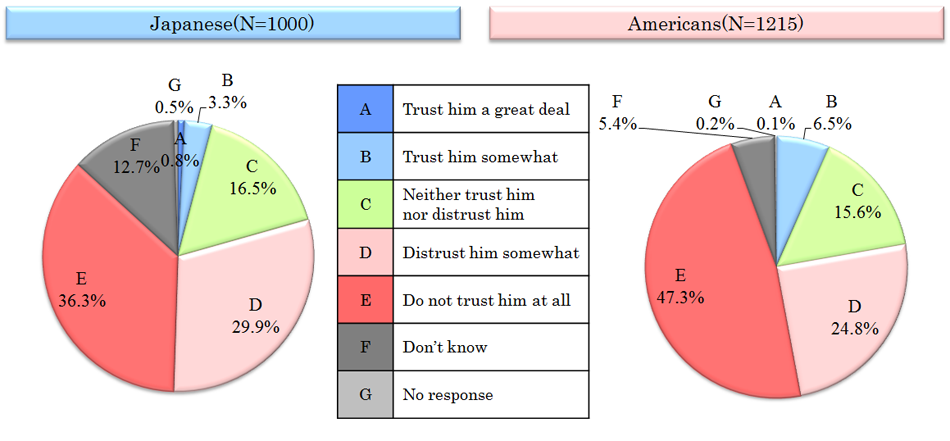
Support in both countries for normalization of diplomatic relations with North Korea is dependent on North Korea's complete denuclearization.
Survey respondents in Japan and the U.S. were asked whether they would support the normalization of diplomatic relations with North Korea, and the majority in both countries (52.3% in Japan and 60.8% in the U.S.) responded that they would support it "only after North Korea completely gives up its nuclear weapons." Under 15% in both countries (11.4% in Japan and 13.0% in the U.S.) supported normalization "after North Korea agrees to denuclearize even before the agreement is implemented."
Less than 10% of respondents in either country (9.7% in Japan and 8.6% in the U.S.) answered that they "oppose normal relations even after North Korea completely gives up its nuclear weapons."
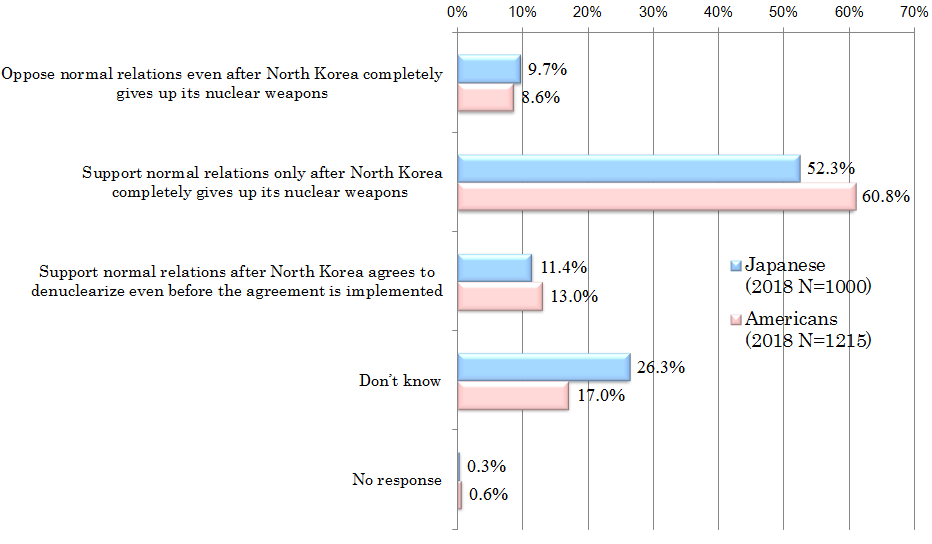
30% of Japanese and 40% of Americans expect U.S. presence in South Korea to decrease if the Korean Peninsula is denuclearized.
People were asked their opinions about the future of the U.S. forces in South Korea, and the larger proportion of respondents in both countries (36.3% in Japan and 36.2% in the U.S.) answered that the U.S. bases in South Korea should be maintained as they are today. Combining this answer with those who responded that the U.S. bases in South Korea should be enlarged (2.2% in Japan and 5.2% in the U.S.), we find that close to 40% of respondents in both countries (38.5% in Japan and 41.4% in the U.S.) believe that the bases should be maintained at or above their current size.
However, roughly 30% of respondents in both countries hold the opposite opinion, i.e. that the U.S. should reduce the size of its bases in South Korea (Japan at 28.8% and the U.S. at 31.4%). Combining that with those who believe the bases should be closed and the U.S. should pull out of South Korea (4.1% in Japan and 11.3% in the U.S), we find that 32.9% of Japanese respondents and 42.7% of American respondents believe that the U.S. military presence should be decreased.
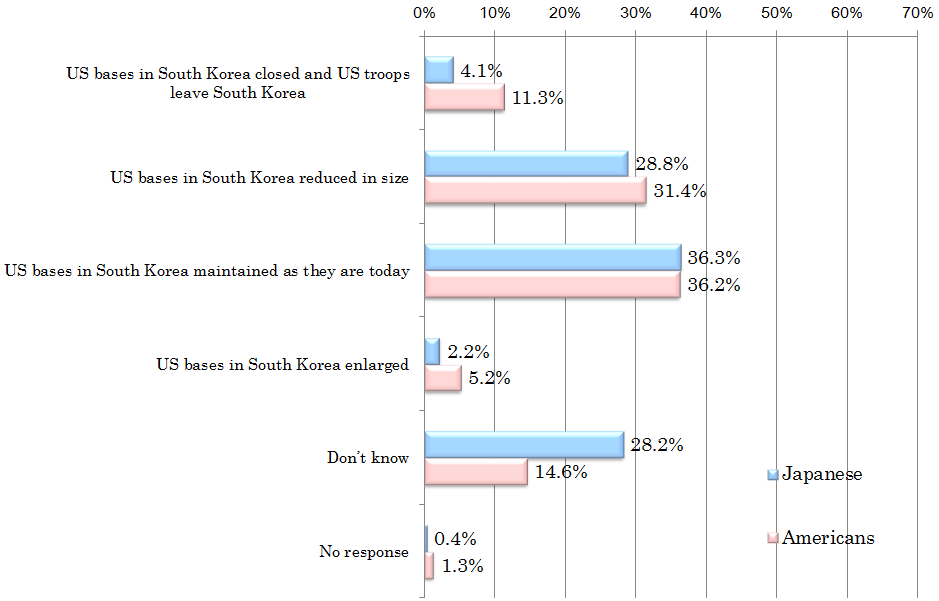
The U.S.-South Korean alliance if the Korean Peninsula is denuclearized.
The greater number of people in both countries stated that "the alliance should remain the same (43.5% in Japan and 52.1% in the U.S.) If we also include the number of respondents who believe the alliance should be strengthened (6.1% in Japan and 20.4% in the U.S.), we find that almost half of Japanese people surveyed, and more than 70% of Americans, believe that the alliance should be maintained or made stronger.
Less than 20% of respondents in either country answered, "the alliance would need to be lessened" (15.9% in Japan and 9.9% in the U.S.) or "the alliance should be terminated" (3.1% in Japan and 1.4% in the U.S.)
Over the last year, the number of people who believe the North Korean crisis has strengthened Japan-U.S. relations has dropped, while the number who believe it has had no impact has increased.
In the survey conducted at the end of last year, many people in both countries held the opinion that the North Korean nuclear threat had strengthened the relationship between Japan and the U.S., but those numbers have changed as big developments have arisen in the negotiations towards denuclearization.
At 36.4%, more Japanese citizens hold the opinion that the crisis has strengthened Japan-U.S. relations, but that number has dropped greatly from 45.8% last year. Conversely, the number of people who believe it has had no impact on relations has risen to 26.7% from 19.7% last year, and those who hold the opinion that the relationship between the U.S. and Japan is now weaker doubled from 3.8% to 7.6%.
Similar to last year's survey, many Americans (30.1%) responded that they believe the relationship is stronger, but this has dropped 11% since last year. As a result, "don't know" became the most frequent response at 32.7%. A total of 19.4% of respondents answered that the crisis "had no impact" on U.S.-Japan relations, an 8% rise over the 11.4% recorded last year.
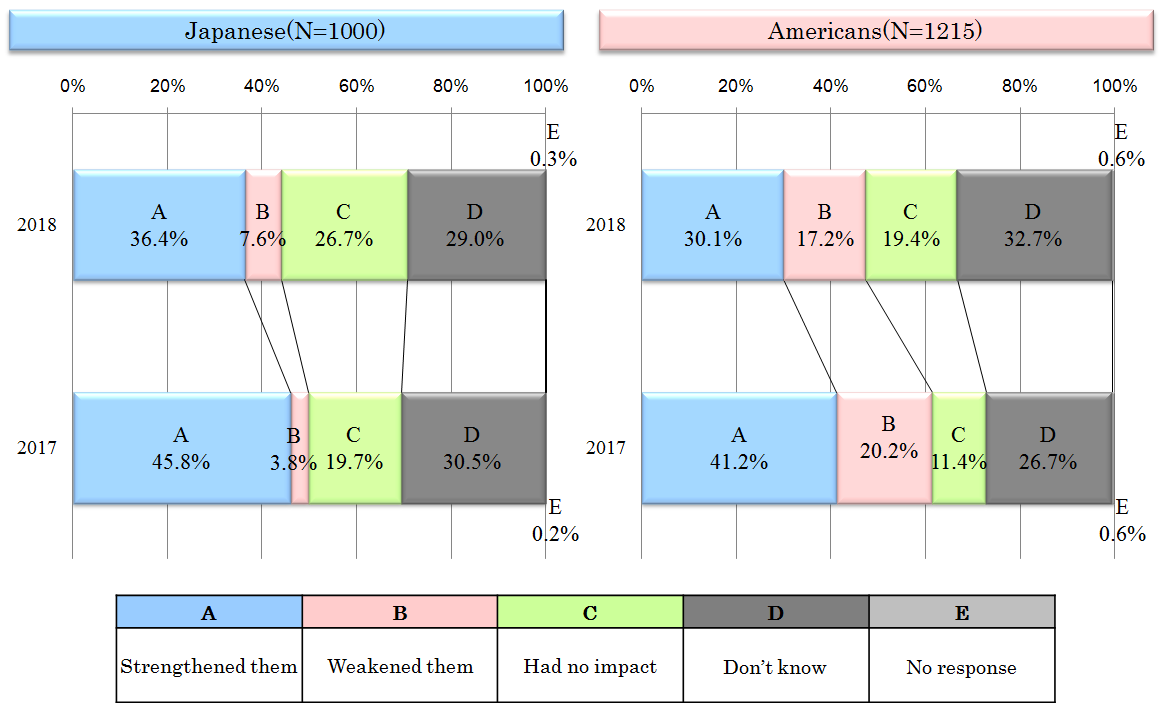
While 60% of U.S. respondents believe that Japan should expand its own military, 50% of Japanese are opposed.
As the Korean Peninsula transforms, 47.5% or almost half of Japanese respondents (an increase from 41.8% last year) think that the "U.S. should maintain its current level of military power" in Asia. However, the number who responded that the "U.S. should decrease its level of military power" also increased from 13.2% last year to 19.7%.
At 52.4%, the majority of Americans also answered that the "U.S. should maintain its current level of military power," an increase from 48.5% last year. However, 16.2% of respondents answered that the "U.S. should increase its level of military power" in Asia, a 12% drop since last year's survey.
We should also pay attention to the fact that there was a 10% increase in Americans answering that the "U.S. should decrease its level of military power" since last year, rising from 8.8% to 18.9%.
We followed up by asking people' s opinions on Japan expanding its military capability in order to contribute more to maintaining stability in Northeast Asia. In Japan, a majority are opposed to such an expansion at 50.9%, much higher than the 17.7% who support it.
This stands in contrast to the U.S., where 58.3% support Japan expanding its military, much higher than the 10.7% who oppose it.
The prospect of the U.S. engaging in a military conflict with any of the following five countries: China, Russia, North Korea, Syria, and Iran.
As the results show, a greater number of Japanese respondents responded that it is either likely or somewhat likely (both answers totaling 44.4%) that a confrontation with North Korea would occur, followed by Syria with a total of 42.9% answering likely or somewhat likely, and 39% answering Iran. The chance of military confrontation with China or Russia were both assessed at likely or somewhat likely by roughly 20% of respondents.
At a total of 59.9%, a greater number of Americans feel that a confrontation with Iran is to some extent likely, followed by Syria at 57.3% and North Korea at 53.1%. For all three of these countries, a majority of Americans answered that military conflict is likely to some extent.
Only 21.1% of American respondents answered that a military confrontation with China is likely.
The important countries for the future of Japan and U.S.
Majority of Japanese, at 78.5%, see the U.S. as their most important partner, followed by China at 48.9%. All other countries selected were on the order of 10% or less.
In contrast, at 47.0%, almost half of respondents in the U.S. selected the UK as their most important partner, followed Canada at 29.9% and Israel at 23.9%, then China and Germany both under 20% at 19.0% and 17.2%, respectively. Only 13.9% of Americans responded that Japan was most important, less than the number who selected China.
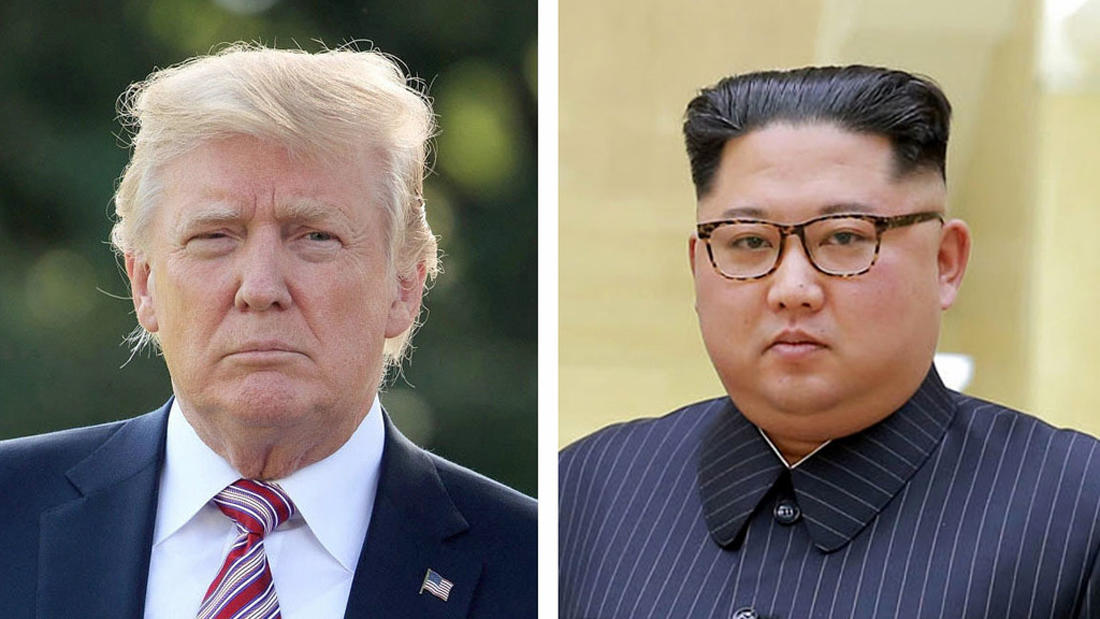
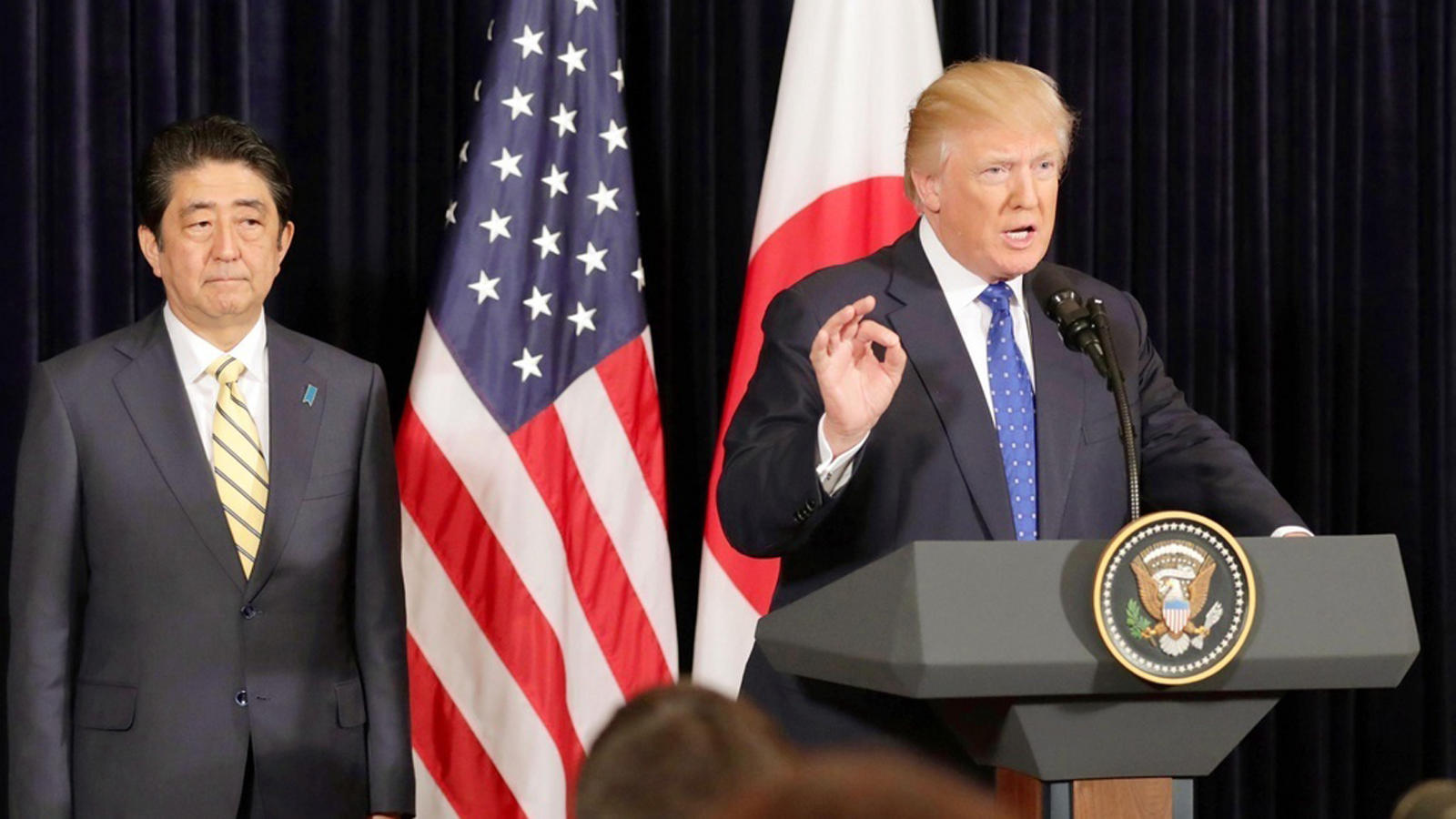
Post a comment